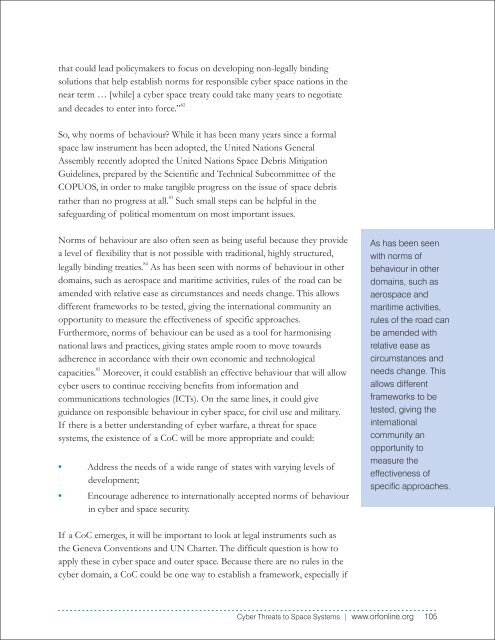AwaitingLaunch_1397728623369
AwaitingLaunch_1397728623369
AwaitingLaunch_1397728623369
You also want an ePaper? Increase the reach of your titles
YUMPU automatically turns print PDFs into web optimized ePapers that Google loves.
that could lead policymakers to focus on developing non-legally binding<br />
solutions that help establish norms for responsible cyber space nations in the<br />
near term … [while] a cyber space treaty could take many years to negotiate<br />
82<br />
and decades to enter into force.”<br />
So, why norms of behaviour? While it has been many years since a formal<br />
space law instrument has been adopted, the United Nations General<br />
Assembly recently adopted the United Nations Space Debris Mitigation<br />
Guidelines, prepared by the Scientific and Technical Subcommittee of the<br />
COPUOS, in order to make tangible progress on the issue of space debris<br />
83<br />
rather than no progress at all. Such small steps can be helpful in the<br />
safeguarding of political momentum on most important issues.<br />
Norms of behaviour are also often seen as being useful because they provide<br />
a level of flexibility that is not possible with traditional, highly structured,<br />
84<br />
legally binding treaties. As has been seen with norms of behaviour in other<br />
domains, such as aerospace and maritime activities, rules of the road can be<br />
amended with relative ease as circumstances and needs change. This allows<br />
different frameworks to be tested, giving the international community an<br />
opportunity to measure the effectiveness of specific approaches.<br />
Furthermore, norms of behaviour can be used as a tool for harmonising<br />
national laws and practices, giving states ample room to move towards<br />
adherence in accordance with their own economic and technological<br />
85<br />
capacities. Moreover, it could establish an effective behaviour that will allow<br />
cyber users to continue receiving benefits from information and<br />
communications technologies (ICTs). On the same lines, it could give<br />
guidance on responsible behaviour in cyber space, for civil use and military.<br />
If there is a better understanding of cyber warfare, a threat for space<br />
systems, the existence of a CoC will be more appropriate and could:<br />
•<br />
•<br />
Address the needs of a wide range of states with varying levels of<br />
development;<br />
Encourage adherence to internationally accepted norms of behaviour<br />
in cyber and space security.<br />
As has been seen<br />
with norms of<br />
behaviour in other<br />
domains, such as<br />
aerospace and<br />
maritime activities,<br />
rules of the road can<br />
be amended with<br />
relative ease as<br />
circumstances and<br />
needs change. This<br />
allows different<br />
frameworks to be<br />
tested, giving the<br />
international<br />
community an<br />
opportunity to<br />
measure the<br />
effectiveness of<br />
specific approaches.<br />
If a CoC emerges, it will be important to look at legal instruments such as<br />
the Geneva Conventions and UN Charter. The difficult question is how to<br />
apply these in cyber space and outer space. Because there are no rules in the<br />
cyber domain, a CoC could be one way to establish a framework, especially if<br />
Cyber Threats to Space Systems | www.orfonline.org 105








